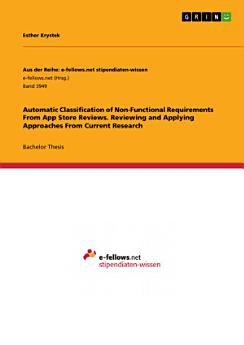Automatic Classification of Non-Functional Requirements From App Store Reviews. Reviewing and Applying Approaches From Current Research
Esther Krystek
Sep. 2021 · Aus der Reihe: e-fellows.net stipendiaten-wissen Boek 3949 · GRIN Verlag
E-boek
33
Bladsye
family_home
Geskik
info
reportGraderings en resensies word nie geverifieer nie. Kom meer te wete
Meer oor hierdie e-boek
Bachelor Thesis from the year 2021 in the subject Business economics - Miscellaneous, grade: 1,3, University of Mannheim, language: English, abstract: The thesis addresses a part of the requirements engineering process (RE), namely the treatment of non-functional requirements. Requirements are commonly divided into functional requirements (FRs) and non-functional requirements (NFRs). NFRs address the non-functional aspects of a system, for example, its user interface. The thesis lays the theoretical background and explores the general nature of NFRs including different taxonomies of NFRs. It then looks closely at NFRs in the context of mobile applications. In their marketplaces, so-called App Stores, users can express their opinion about an app after downloading and using it. Software developers can collect requirements straight from these reviews. This can help them improve their software to meet users' expectations. Due to the vast amount of review data manual inspection is tedious, time-consuming, cumbersome, or even infeasible. Tools to automatically classify such reviews might aid with this problem. However, there is still no solution to automatically extract NFRs from app store reviews and classify them into different types in practice. The thesis, therefore, assesses the current state of research in developing automated solutions to classify NFRs from app store reviews. It analyzes several past approaches to automatically classify NFRs from app store reviews using machine learning and looks at the performance of different algorithms used for these approaches. It states that the so-called Support Vector Machine (SVM) algorithm performed best in the settings analyzed. The second practical part of the thesis then applies this SVM algorithm onto a given dataset with labeled reviews using Python. The reviews are classified into either one of these categories or no category at all: Usability, Dependability, Performance, and Supportability.
Gradeer hierdie e-boek
Sê vir ons wat jy dink.
Lees inligting
Slimfone en tablette
Installeer die Google Play Boeke-app vir Android en iPad/iPhone. Dit sinkroniseer outomaties met jou rekening en maak dit vir jou moontlik om aanlyn of vanlyn te lees waar jy ook al is.
Skootrekenaars en rekenaars
Jy kan jou rekenaar se webblaaier gebruik om na oudioboeke wat jy op Google Play gekoop het, te luister.
E-lesers en ander toestelle
Om op e-inktoestelle soos Kobo-e-lesers te lees, moet jy ’n lêer aflaai en dit na jou toestel toe oordra. Volg die gedetailleerde hulpsentrumaanwysings om die lêers na ondersteunde e-lesers toe oor te dra.








